Schumann Quartett
String Quartet
Erik Schumann
Violin
Ken Schumann
Violin
Veit Hertenstein
Viola
Mark Schumann
Cello
“Personal and profound” (BBC Music Magazine): “With no ifs or buts, the ‘Schumanns’ are among the best quartets in the world” (SZ) and certainly “one of the most exciting string quartets of the present day.” (Fono Forum)
Schumann Quartett
- Biography
- Images
- Programme
- Schedule
- Discography
- Videos
- Links
- Contact
Biography

The Schumann Quartet has reached a stage where anything is possible, because it has dispensed with certainties.
The Schumann Quartet has reached a stage where anything is possible, because it has dispensed with certainties. This also has consequences for audiences, which from one concert to the next have to be prepared for all eventualities: “A work really develops only in a live performance,” the quartet says. “That is 'the real thing', because we ourselves never know what will happen. On the stage, all imitation disappears, and you automatically become honest with yourself. Then you can create a bond with the audience – communicate with it in music.” This live situation will gain an added energy in the near future: Sharon Kam, Kit Armstrong, Anna Lucia Richter, Sabine Meyer, Katharina Konradi und Alexey Stadler are among the quartet's current partners.
Special highlights in the 2023/2024 season: In autumn 2023, the ensemble will perform the opening concert for the new hall at the Royal Irish Academy of Music in Dublin, perform at the Dvorak Prague International Music Festival, and give a concert in Linz in honor of the great patron Elisabeth Sprague Coolidge, among other events. In January 2024, they will perform two concerts of works by Aribert Reimann in Madrid on the royal Stradivari instruments and embark again on a U.S. tour that will conclude with a residency in New York City at the Chamber Music Society of Lincoln Center. They will also perform at the Philharmonie in Berlin and Essen, with Kit Armstrong and a Mozart project in Luxembourg and Cologne, as well as at the Wiener Konzerthaus and the SWR Festival in Schwetzingen.
Its album “Intermezzo” (2018 | Mendelssohn Bartholdy, Schumann und Reimann with Anna-Lucia Richter) has been hailed enthusiastically both at home and abroad and received the award “Opus Klassik“ in the category quintet. In 2020 the quartet has expanded its discography with "Fragment" and his examination of one of the masters of the string quartet: Franz Schubert. On the occasion of the 100th anniversary of the radio, the quartet will dedicate itself to a very special project: An album of pieces around and from 1923. Together with the Bavarian Radio, they will record works by Alban Berg, Leoš Janáček, Ernst Krenek and Aaron Copland.
The three brothers Mark, Erik and Ken Schumann have been playing together since their earliest childhood – meanwhile violist Veit Hertenstein completes the quartet. The four musicians enjoy the way they communicate without words. Although the individual personalities clearly manifest themselves, a common space arises in every musical work in a process of spiritual metamorphosis. The quartet's openness and curiosity may be partly the result of the formative influence exerted on it by teachers such as Eberhard Feltz, the Alban Berg Quartet, or partners such as Menahem Pressler.
Awards, CD releases – it is always tempting to speculate on what factors have led to many people viewing the Schumann Quartet as one of the best in the world. But the four musicians themselves regard these stages more as encounters, as a confirmation of the path they have taken. “We really want to take things to extremes, to see how far the excitement and our spontaneity as a group take us,” says Ken Schumann, the middle of the three Schumann brothers. They charmingly sidestep any attempt to categorise their sound, approach or style, and let the concerts speak for themselves.
And the critics approve: “Fire and energy. The Schumann Quartet plays staggeringly well [...] without doubt one of the very best formations among today’s abundance of quartets, […] with sparkling virtuosity and a willingness to astonish” (Harald Eggebrecht in Süddeutsche Zeitung).*
Erik Schumann plays on a violin by Joseph Guarneri filius Andrea from 1690, kindly made available to him by the Guadagnini Foundation Stuttgart.
Ken Schumann plays an old Italian violin from the mid-18th century, kindly made available to him privately.
Veit Hertenstein plays a viola made by the Amati brothers in 1616.
Mark Schumann plays a cello by Giovanni & Francesco Grancino from 1680, generously loaned to him by MERITO Sit Vienna.
*Quotes taken from an interview with journalists from the classical music magazine VAQuotes taken from an interview with journalists from the classical music magazine VAN (van-magazin.de)
Special highlights in the 2023/2024 season: In autumn 2023, the ensemble will perform the opening concert for the new hall at the Royal Irish Academy of Music in Dublin, perform at the Dvorak Prague International Music Festival, and give a concert in Linz in honor of the great patron Elisabeth Sprague Coolidge, among other events. In January 2024, they will perform two concerts of works by Aribert Reimann in Madrid on the royal Stradivari instruments and embark again on a U.S. tour that will conclude with a residency in New York City at the Chamber Music Society of Lincoln Center. They will also perform at the Philharmonie in Berlin and Essen, with Kit Armstrong and a Mozart project in Luxembourg and Cologne, as well as at the Wiener Konzerthaus and the SWR Festival in Schwetzingen.
Its album “Intermezzo” (2018 | Mendelssohn Bartholdy, Schumann und Reimann with Anna-Lucia Richter) has been hailed enthusiastically both at home and abroad and received the award “Opus Klassik“ in the category quintet. In 2020 the quartet has expanded its discography with "Fragment" and his examination of one of the masters of the string quartet: Franz Schubert. On the occasion of the 100th anniversary of the radio, the quartet will dedicate itself to a very special project: An album of pieces around and from 1923. Together with the Bavarian Radio, they will record works by Alban Berg, Leoš Janáček, Ernst Krenek and Aaron Copland.
The three brothers Mark, Erik and Ken Schumann have been playing together since their earliest childhood – meanwhile violist Veit Hertenstein completes the quartet. The four musicians enjoy the way they communicate without words. Although the individual personalities clearly manifest themselves, a common space arises in every musical work in a process of spiritual metamorphosis. The quartet's openness and curiosity may be partly the result of the formative influence exerted on it by teachers such as Eberhard Feltz, the Alban Berg Quartet, or partners such as Menahem Pressler.
Awards, CD releases – it is always tempting to speculate on what factors have led to many people viewing the Schumann Quartet as one of the best in the world. But the four musicians themselves regard these stages more as encounters, as a confirmation of the path they have taken. “We really want to take things to extremes, to see how far the excitement and our spontaneity as a group take us,” says Ken Schumann, the middle of the three Schumann brothers. They charmingly sidestep any attempt to categorise their sound, approach or style, and let the concerts speak for themselves.
And the critics approve: “Fire and energy. The Schumann Quartet plays staggeringly well [...] without doubt one of the very best formations among today’s abundance of quartets, […] with sparkling virtuosity and a willingness to astonish” (Harald Eggebrecht in Süddeutsche Zeitung).*
Erik Schumann plays on a violin by Joseph Guarneri filius Andrea from 1690, kindly made available to him by the Guadagnini Foundation Stuttgart.
Ken Schumann plays an old Italian violin from the mid-18th century, kindly made available to him privately.
Veit Hertenstein plays a viola made by the Amati brothers in 1616.
Mark Schumann plays a cello by Giovanni & Francesco Grancino from 1680, generously loaned to him by MERITO Sit Vienna.
*Quotes taken from an interview with journalists from the classical music magazine VAQuotes taken from an interview with journalists from the classical music magazine VAN (van-magazin.de)
„Fire and energy. The Schumann Quartet plays staggeringly well [...] without doubt one of the very best formations among today’s abundance of quartets, […] with sparkling virtuosity and a willingness to astonish.”Sueddeutsche Zeitung • Harald Eggebrecht • March 10th, 2017
This biography is to be reproduced without any changes, omissions or additions, unless expressly authorized by artist management.
Images

Programme

2024 / 2025
2023 / 2024
Program I
Beethoven: String Quartet No. 11, Op. 95 “Quartetto serioso
Janacek: String Quartet No. 1 “Kreutzer Sonata”
***
Brahms: String Quartet No. 3 in B flat Major, Op. 67
Program II
Mozart: String Quartet No. 18 in A Major, K 464
Alban Berg: String Quartet, Op. 3
***
Beethoven: String Quartet No. 12 in E-flat Major, Op. 127
Alban Berg: String Quartet, Op. 3
***
Beethoven: String Quartet No. 12 in E-flat Major, Op. 127
Program III
"1923" - 100 years of broadcasting
"1923" - 100 years of broadcasting
Berg: String Quartet, Op. 3
Janáček: String Quartet No. 1 “Kreutzersonate“
***
Krenek: String Quartet No. 3, Op. 20
Copland: Movement for String Quartet
Schedule

28/04/2024
15:00 h
15:00 h
Philharmonie Haarlem (Kleiner Zaal)
Haarlem, Netherlands
Haarlem, Netherlands
03/05/2024
19:30 h
19:30 h
Stadttheater Neuhaussaal
Regensburg, Germany
Regensburg, Germany
08/05/2024
10:25 h
10:25 h
Residenz zu Salzburg, Konferenzzimmer
Salzburg, Austria
Salzburg, Austria
Schumann Quartett, Simply Quartet
08/05/2024
14:00 h
14:00 h
Residenz zu Salzburg, Konferenzzimmer
Salzburg, Austria
Salzburg, Austria
Schumann Quartett, Simply Quartet
10/05/2024
19:00 h
19:00 h
Konzerthaus Wien, Mozartsaal
Wien, Austria
Wien, Austria
Schumann Quartett, Musicbanda Franui, Trio Lepschi, Kian Soltani, Fleur Barron, Julius Drake, Johanna Summer, Dörte Lyssewski
11/05/2024
18:00 h
18:00 h
Konzerthaus Wien, Mozartsaal
Wien, Austria
Wien, Austria
Schumann Quartett, Musicbanda Franui, 5/8erl in Ehr'n, Patrick Pulsinger, Kian Soltani, Christian Zehnder, Konstantin Krimmel, Julius Drake, Johanna Summer, Wolfgang Kogert, Dörte Lyssewski, Bettina Lieder, Elisa Plüss
12/05/2024
19:00 h
19:00 h
Historisches Stadttheater Weißenhorn
Weißenhorn, Germany
Weißenhorn, Germany
19/05/2024
11:00 h
11:00 h
Schwetzinger Schloss (Mozartsaal)
Schwetzingen, Germany
Schwetzingen, Germany
24/05/2024
20:00 h
20:00 h
Landschaftspark-Nord, Gebläsehalle Preise
Duisburg, Germany
Duisburg, Germany
Schumann Quartett, Kit Armstrong, u.a.
25/05/2024
20:00 h
20:00 h
Landschaftspark-Nord, Gebläsehalle Preise
Duisburg, Germany
Duisburg, Germany
Schumann Quartett, Kit Armstrong, u.a.
28/05/2024
19:30 h
19:30 h
Residenz Würzburg (Kaisersaal)
Würzburg, Germany
Würzburg, Germany
Schumann Quartett, Kit Armstrong, u.a.
28/05/2024
22:30 h
22:30 h
Residenz Würzburg (Kaisersaal)
Würzburg, Germany
Würzburg, Germany
Schumann Quartett, Kit Armstrong, u.a.
29/05/2024
19:30 h
19:30 h
Residenz Würzburg (Kaisersaal)
Würzburg, Germany
Würzburg, Germany
Schumann Quartett, Kit Armstrong, u.a.
29/05/2024
22:30 h
22:30 h
Residenz Würzburg (Kaisersaal)
Würzburg, Germany
Würzburg, Germany
Schumann Quartett, Kit Armstrong, u.a.
05/07/2024
19:00 h
19:00 h
Wigmore Hall
London, United Kingdom
London, United Kingdom
21/07/2024
18:00 h
18:00 h
Evangelisch Reformierte Kirche
Zweisimmen, Switzerland
Zweisimmen, Switzerland
Discography

Rosamunde – Fragment Pt. 1
Franz Schubert
String Quartet No.13 D.804 "Rosamunde"
String Quartet No.13 D.804 "Rosamunde"
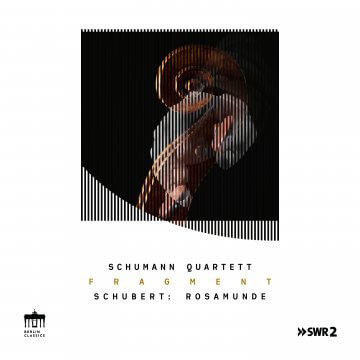
Chiaroscuro
Wolfgang Amadeus Mozart
Five Fugues from Bach´s The Well-Tempered Clavier, KV 4025
Felix Mendelssohn-Bartholdy
Fugue in E-flat major, Op. 81 No. 4
Philip Glass
String Quartet No. 2 "company"
Dmitri Shostakovich
Two Pieces for String Quartet (1931)
Anton Webern
Six Bagatelles, Op. 9
Leoš Janáček
String Quartet No. 2 "intimate letters"
George Gershwin
Lullaby
Five Fugues from Bach´s The Well-Tempered Clavier, KV 4025
Felix Mendelssohn-Bartholdy
Fugue in E-flat major, Op. 81 No. 4
Philip Glass
String Quartet No. 2 "company"
Dmitri Shostakovich
Two Pieces for String Quartet (1931)
Anton Webern
Six Bagatelles, Op. 9
Leoš Janáček
String Quartet No. 2 "intimate letters"
George Gershwin
Lullaby
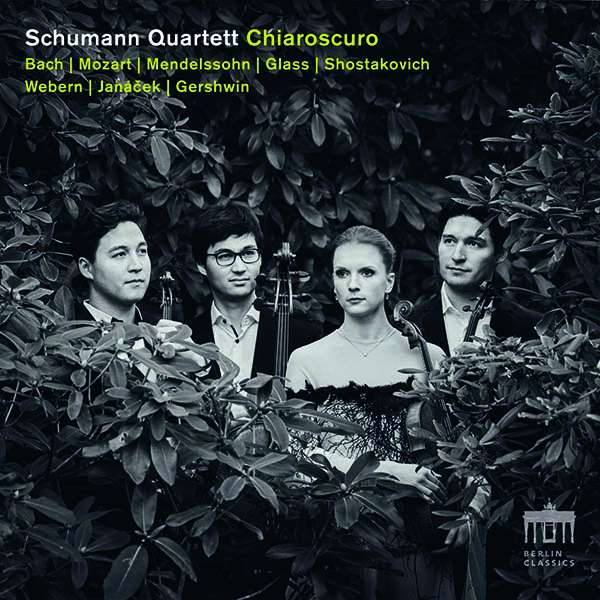
Intermezzo
Robert Schumann
String Quartet No. 1 in A minor
Aribert Reimann
Adagio zum Gedenken an Robert Schumann
Robert Schumann / Aribert Reimann
6 Songs Op. 107 for Soprano and String Quartet
Felix Mendelssohn Bartholdy
String Quartet No. 1 in E-flat major
Anna Lucia Richter – Soprano
String Quartet No. 1 in A minor
Aribert Reimann
Adagio zum Gedenken an Robert Schumann
Robert Schumann / Aribert Reimann
6 Songs Op. 107 for Soprano and String Quartet
Felix Mendelssohn Bartholdy
String Quartet No. 1 in E-flat major
Anna Lucia Richter – Soprano
Landscapes
Joseph Haydn
String Quartet in B-Flat Major, Op. 76/4 "Sunrise"
Toru Takemitsu
"Landscape" for String Quartet
Béla Bartók
String Quartet No. 2
Arvo Pärt
"Fratres" for String Quartet
String Quartet in B-Flat Major, Op. 76/4 "Sunrise"
Toru Takemitsu
"Landscape" for String Quartet
Béla Bartók
String Quartet No. 2
Arvo Pärt
"Fratres" for String Quartet
Mozart - Ives - Verdi
Wolfgang Amadeus Mozart
String Quartet in D major K. 575
Chales Ives
String Quartet No. 2
Giuseppe Verdi
Quartetto in E minor
String Quartet in D major K. 575
Chales Ives
String Quartet No. 2
Giuseppe Verdi
Quartetto in E minor
Videos

Schumann Quartet - Brahms: String Quartet No. 2 in A minor, Op. 51
Schumann Quartet @ Wigmore Hall London (16.10.2020)
Schumann Quartet - Schubert: Quartet Movement in C Minor, D 703: II. Andante (Fragment)
Schumann Quartet - Schubert: String Quartet No. 6, D 74: IV. Allegro (Official Music Video)
Schumann Quartet – "Intermezzo" (Trailer)
Schumann Quartet – "Landscapes" (Trailer)
Links

Contact

 Download Biography:
Download Biography: 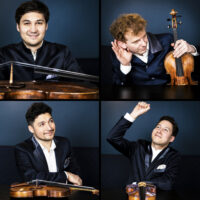

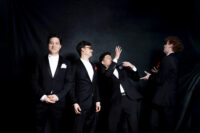
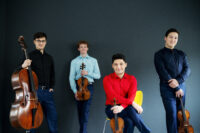
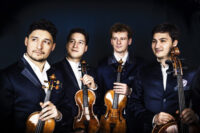
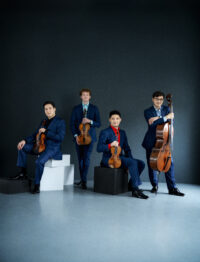
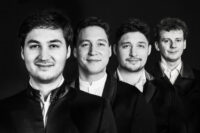
 Official Website
Official Website Facebook
Facebook


